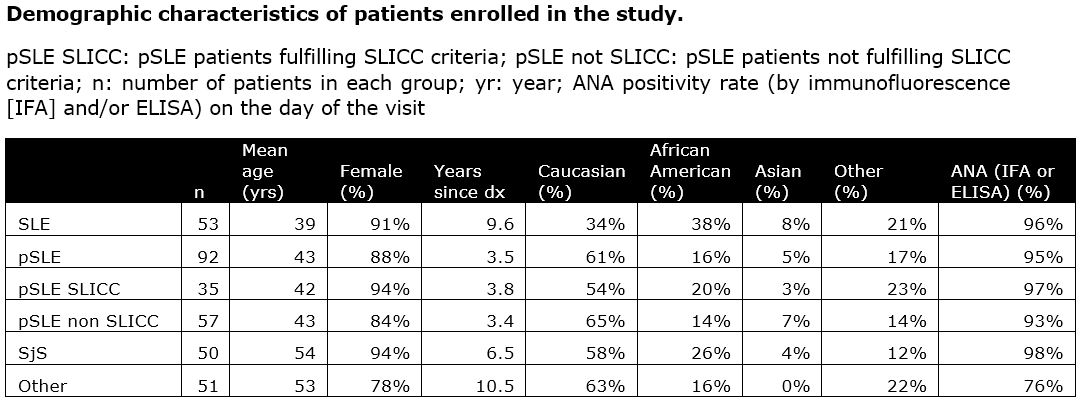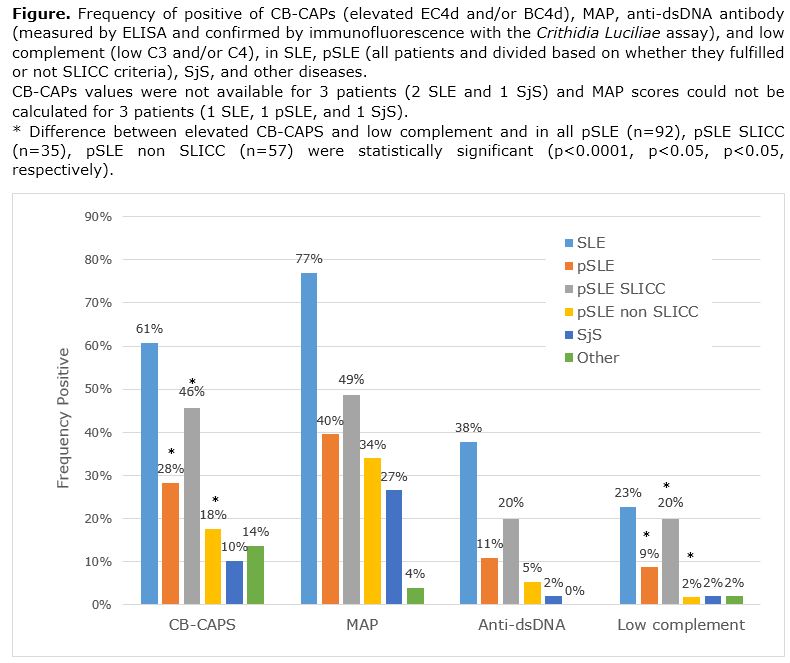Session Information
Date: Tuesday, October 23, 2018
Title: 5T090 ACR Abstract: SLE–Clinical III: Translational Aspects (2832–2837)
Session Type: ACR Concurrent Abstract Session
Session Time: 2:30PM-4:00PM
Background/Purpose: We showed previously that complement activation – cell-bound complement activation products (CB-CAPS) or multi-analyte assay panel (MAP) – is a sensitive and specific biomarker for the diagnosis of systemic lupus erythematosus (SLE). We report here the frequency of positive CB-CAPS and MAP in subjects with diseases in the lupus spectrum (SLE, probable SLE [pSLE], primary Sjogren’s syndrome [SjS]) and other rheumatic diseases compared to low plasma complement levels and anti-dsDNA positivity.
Methods: SLE patients fulfilled ACR and SLICC classification criteria. pSLE were enrolled if the investigator had a high suspicion of lupus and fulfilled only 3 ACR criteria (including anti-nuclear antibodies [ANA]); fulfillment of SLICC criteria was not required. Diagnosis of SjS was based on modified ACR criteria and on expert opinion for other diseases. CB-CAPS (complement split product C4d bound to erythrocytes [EC4d] and B-cells [BC4d]) were measured by quantitative flow cytometry. Serum complement proteins (C3 and C4) and autoantibodies were measured by turbidimetry and ELISA, respectively. Anti-dsDNA positivity was confirmed by immunofluorescence with Crithidia Luciliae. MAP was evaluated as previously described (Putterman et al., Lupus Science & Medicine, 2014). Statistical comparisons were done by Chi-square analysis.
Results: The study included 53 SLE; 92 pSLE, 35 (38%) of whom fulfilled SLICC criteria; 50 SjS; and 51 other diseases including rheumatoid arthritis (n=31), juvenile idiopathic arthritis (n=3), psoriatic arthritis (n=10), ankylosing spondylitis (n=1), dermatomyositis (n=4), and scleroderma (n=2). Patient characteristics are reported in the Table. A higher percentage of pSLE (fulfilling or not SLICC criteria) were CB-CAPS and MAP positive compared to anti-dsDNA positive or having low plasma complement levels, indicating higher sensitivity of CB-CAPS and MAP than standard markers, not only in SLE, but also in pSLE. Frequency of positive MAP was 27% in SjS, supporting other studies that suggest that complement may be activated in some SjS patients. Positive CB-CAPS or MAP were infrequent in other rheumatic diseases (Figure).
Conclusion: This study demonstrates that CB-CAPS and MAP are positive more frequently than standard immunological markers (eg, soluble complement proteins and anti-dsDNA antibodies) to better identify patients with definite SLE and probable SLE. CB-CAPS were statistically significantly better than low C3/C4 as markers of complement activation and represent new biomarkers for the diagnosis of lupus spectrum disorders.
Disclosure: R. Ramsey-Goldman, Exagen Diagnostics, Inc, 2; R. Alexander, Exagen Diagnostics, Inc., 3; E. Massarotti, Exagen Diagnostics, Inc, 2; D. J. Wallace, Exagen Diagnostics, Inc, 2; S. Narain, Exagen Diagnostics, Inc, 2; C. Arriens, Exagen Diagnostics, Inc, 2; C. E. Collins, Exagen Diagnostics,Inc, 2; A. Saxena, Exagen Diagnostics, Inc, 2; C. Putterman, Exagen Diagnostics, Inc, 2; K. C. Kalunian, Exagen Diagnostics, Inc, 2; A. Sace, None; R. Lafon, None; T. O'Malley, Exagen Diagnostics, 3; J. Ligayon, Exagen Diagnostics, Inc, 3; C. Ibarra, Exagen Diagnostics, 1, 3; J. Conklin, Exagen Diagnostics Inc., 3; T. Dervieux, exagen, 3; A. Weinstein, Exagen Diagnostics, Inc, 5.
To cite this abstract in AMA style:
Ramsey-Goldman R, Alexander R, Massarotti E, Wallace DJ, Narain S, Arriens C, Collins CE, Saxena A, Putterman C, Kalunian KC, Sace A, Lafon R, O'Malley T, Ligayon J, Ibarra C, Conklin J, Dervieux T, Weinstein A. Complement Activation Is a Feature of Diseases in the Lupus Spectrum [abstract]. Arthritis Rheumatol. 2018; 70 (suppl 9). https://acrabstracts.org/abstract/complement-activation-is-a-feature-of-diseases-in-the-lupus-spectrum/. Accessed .« Back to 2018 ACR/ARHP Annual Meeting
ACR Meeting Abstracts - https://acrabstracts.org/abstract/complement-activation-is-a-feature-of-diseases-in-the-lupus-spectrum/


